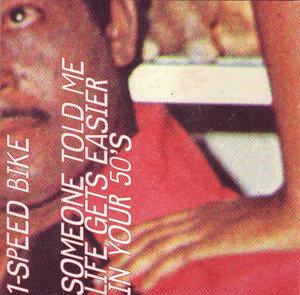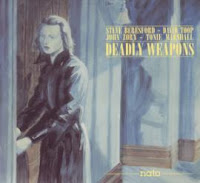

As with many of the latter artists, drummer Ronald Shannon Jackson's ascent to the critical recognition and mild popular success he enjoyed in the 1980s did not come early in life. In 1979, at the age of 39, Jackson formed The Decoding Society, a medium-sized ensemble that would become an ongoing vehicle to showcase his compositional/arranging talent and his uniquely propulsive drumming style. Sadly, by the mid–1990s, Jackson had lapsed into relative obscurity alongside many of his colleagues.
In his home town of Fort Worth, Texas, Ronald Shannon Jackson's exposure to a healthy variety of vernacular musics—country, gospel, jazz, blues, and soul—and his subsequent, early performance career, were key ingredients in his artistic trajectory, culminating in the exuberant compositions and sounds of The Decoding Society. After beginning his performing career in Texas, Jackson left the southwest for New York City in 1966 and quickly found work with Betty Carter, Charles Mingus, and numerous other prominent jazz artists. His most notable affiliation during this period was with seminal free jazz figure Albert Ayler. Soon thereafter he became relatively inactive on the scene for several years.
In 1974 Jackson met Ornette Coleman, began "lessons" with Coleman on his "harmolodic" theory, and recorded and performed with the original incarnation of Coleman's Prime Time Ensemble. Jackson's career accelerated in the late Seventies as he made formidable contributions to one of Cecil Taylor's many working ensembles, and participated in the landmark James Blood Ulmer recording, Are You Glad to Be in America? Certainly, by these late Seventies recordings, Jackson’s drumming was already indicative of what would become his signature style: an energetic pushing of the pulse, a loose and swinging feel, a focus on tom-tom and snare work, and the usage of parade rhythms (i.e. patterns involving repetitions of two sixteenth-notes followed by one or two eighth-notes).
Jackson gathered a combination of seasoned loft players and young, talented newcomers in 1979 as the first edition of The Decoding Society. Over the next decade, the group performed extensively and released about one recording per year. Personnel changes occurred over the years, but during the course of the Eighties and into the early Nineties there was a handful of core units anchored by some relatively long-term, primary performers. Unfortunately, Jackson's first six studio albums are out of print, despite most having seen at least a brief appearance on CD format. Jackson left New York City in the early Nineties and returned to Texas where he currently resides. Three studio Decoding Society recordings, his latest from the Nineties, document a period of seemingly sporadic activity.
Fortunately for those of us who bemoaned an almost complete disappearance of commercially available Ronald Shannon Jackson recordings, and for those who may have missed the opportunity the first time around, the Knitting Factory's KnitClassics label (a division of the jazz/pop club's Knitting Factory Records) has released nine "reissue" recordings by Jackson over the course of the year 2000, eight of which involve some version of The Decoding Society. Four out of these nine recordings were actually previously unreleased. Eight were recorded, either in the studio or live in performance during a span between 1983 and 1988, while one dates from a 1994 concert. The KnitClassics recordings provide broad coverage of Jackson and The Decoding Society's work through various editions of the band and their concomitant compositional and stylistic progression.
In response to his formulation of and early work with the Decoding Society, Jackson was critiqued as a primary participant in the so-called "new fusion" movement of the early Eighties. This movement was ostensibly derived from Coleman's then recent foray into electric music, forming a parallel to the way in which Seventies fusion emerged from the electric music of Miles Davis. Indeed, Jackson's first recording under his own name, The Decoding Society's Eye on You (About Time Records, 1980), exhibited more overt influence from Coleman than any subsequent work. Yet Eye on You was not merely an homage to Coleman, but in fact documented a new artistic voice.
For the first version of The Decoding Society, as well as most later versions, Jackson selected instrumentation with doublings similar to Coleman's Prime Time (and Free Jazz) ensemble: two or three saxophonists who each played multiple horns (or one sax and one trumpet), and initially two guitars and one bass, which quickly reversed to become one guitar (a teenage Vernon Reid who later formed Living Colour) and two basses (often in fretted/unfretted combination). Violin, vibes, and trombone made sporadic appearances and later on, lineups focusing on a core of multiple guitarists would return.
On Eye on You and subsequent early Decoding Society recordings, the ensemble's polyphonic texture was clearly rooted in Coleman's elusive "harmolodic system" which professes an equal role for harmony, movement (i.e. rhythm), and melody, and dispenses with traditional notions of key and pitch. Each instrument, in theory, would be capable of playing a rhythmic role, a harmonic role, a melodic role, or some combination thereof; a similar blurring applied to lead/soloing and accompanying roles. Moreover, Jackson's compositions did not typically focus on any one key. The combination of sharply contrasting, implied tonal centers, the predominance of polyphony over harmony, and an often heterophonic relationship (due to looseness in both rhythm and pitch) between ostensibly unison-based parts, all contributed to the prevailing tonal ambiguity.
Jackson's compositions for Eye on You were frequently built out of busy and even frenetic webs of multiple
melodies and ostinato figures; the resultant energy was a reminder of Jackson's affiliation with Cecil Taylor.
Multiple themes, usually carried by the horns and sometimes the guitar, were presented both as "head" melodies
(at the beginning of the composition) and as material underneath one or more soloists. Melody instruments typically
played either in unison or fourths. Melodic material often recalled Coleman in its simple motives and lazy, floating
lyricism; at times Ayler in its urgent diatonicism; and at other times Mingus in its bluesy, spy-theme quality. Augmented
seconds occasionally peppered the sound with an “eastern” sensibility. Melodies sometimes floated freely in their relationship
to the pulse; sometimes they swung playfully and festively; and sometimes they serenely presented one of Jackson's gorgeous—yet
still tonally ambiguous—ballads. Moreover, Jackson demonstrated an ability to develop long, snaking, sequencing melodies,
something he no doubt brought with him from his experience with Coleman. Melodic development and structure formed the basis
of Jackson's compositions, but free-blowing, both in solo and group configurations, abounded as well.
The Decoding Society sound was alternately (or simultaneously) hot and cool, savage and gentle, danceable and contemplative. It was a brew of African, “eastern,” and American sounds. Tempo, meter, feel, and stylistic references varied across different compositions and within single compositions as well. Jackson combined his parade rhythms with soulful tenor saxophone lines, the bluesy chatter of electric guitars, and the high-pitched exoticism of soprano saxophones (and high trumpet parts). Like many of the jazz giants before him, he showed a knack for creating a big sound out of a relatively small band.
In 1981, The Decoding Society recorded and released two albums for the German Moers label. Three more releases for Island (or Antilles/Island) Records followed in 1982, 1983, and 1985 respectively. All five of the latter recordings involved a fairly stable unit whose core consisted of Jackson, Vernon Reid (now the sole guitarist and a dominant voice in the ensemble), two bassists, and two to three horns (limited to saxophones on the Moers releases and expanded to include trumpet or trombone on the Island releases).
The Moers dates (which resulted in Nasty and Street Priest) were well recorded, effectively highlighting the busy, melodic interplay of the two bassists who served less in the traditional/functional bass roles and more in melodic roles that were on par with the horns and guitar. The feel was overall more funky and the melodies more catchy than on Eye on You. Reid was given more room to stretch out, while the saxophones continued to explore the high register, and Jackson continued to embed rhythms and melodies within a polyphonic texture that exhibited Coleman's influence. Nevertheless, this music had rapidly and unquestionably become Jackson's own and the Moers recordings exhibit some of his finest work.
The Island period (starting with Man Dance and Barbecue Dog) represented the height of the group's visibility and popularity. Funk and blues gestures had become more overt than ever, contributing to a pastiche not found in the earlier work. Tempo and feel shifted rapidly from section to section. Hints of tonality, often in funk-based solo sections, could now be heard in contrast to polytonal and atonal sections. Unison sections at very fast tempos and Reid's fiery guitar work both exhibited the flashiness reminiscent of Seventies fusion, yet the signature rhythms, quirky melodies, and arranging/orchestration style assured the listener that this sound was still unmistakably Jackson's. Despite the return of the violin, the addition of the trombone, some interesting stylistic forays into country, bebop, and space funk, and the promise of a Bill Laswell production, the third Island release, Decode Yourself, is marred by a thin sound, gimmicky electronic drum and synthesizer timbres, and (surprisingly) a plodding, four-square rhythmic monotony.
Tracklist:
- Shannon Jackson & Decoding Society - Street Priest - 1. Street Priest (6:17)
- Shannon Jackson & Decoding Society - Street Priest - 2. Sperm Walk (8:07)
- Shannon Jackson & Decoding Society - Street Priest - 3. City Witch (5:51)
- Shannon Jackson & Decoding Society - Street Priest - 4. Sandflower (4:21)
- Shannon Jackson & Decoding Society - Street Priest - 5. Hemlock For Cordials (7:05)
- Shannon Jackson & Decoding Society - Street Priest - 6. Chudo Be (8:06)
Quali: 320
Size: 96 MB
Source: Vinyl
Download
http://rapidshare.com/files/190376419/SJADSSP.rar
Tags:












